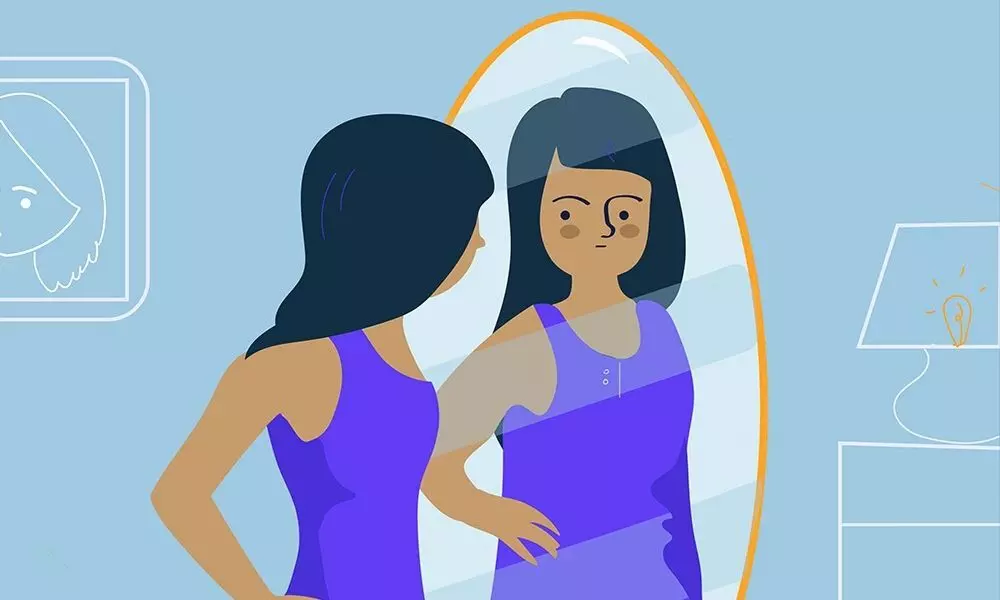What is body dysmorphia? How do filters, and image editing apps create low esteem?
Facetune apps make it appear as if everyone has a small waist, lush lips, and a blemish-free face
By Anoushka Caroline Williams Published on 27 March 2023 5:44 AM GMT
Representational Image
Hyderabad: Looking at retouched images makes people insecure about themselves and their looks.
New apps are helping to erase all insecurities of people. It creates a make-believe image of people. Everyone appears to be more gorgeous, successful, or simply having a better life. Facetune apps make it appear as if everyone has a small waist, lush lips, and a blemish-free face.
Retouched images can lead to anxiety and mood changes
As a result of such a disparity between people's private and public personas, there is a developing dysmorphia and psychological discomfort. According to studies, women expressed more anxiety, worse mood, and lesser confidence when forced to upload an unedited selfie. This demonstrates a definite change in psychological state as a direct effect of being unable to alter a photograph.
There are real-life therapeutic consequences of this research related to mood, anxiety, and eating disorders.
Sadly, time spent on social media utilizing these filters can sometimes do more harm than good by modifying our expectations. Beauty filters on social media are known for emphasizing Euro-centric aesthetic characteristics such as lighter eyes, a smaller nose, and flushed cheeks. Others completely alter the appearance of the face by smoothing out every pore, increasing the size of the lips, and altering the form of the eyes.
“It’s not surprising to see people of all ages indulging in the photoshop trend. Using filters and photoshopping has not spared any age group. We have adolescents, young adults, and middle-aged people doing it, more seen in females comparatively. Whilst the simple reasons could be to look cool and glamorous and compete with their peers, seek general validation for their looks and personalities, on introspection, there could be serious underlying mental health issues associated with social anxiety, eating disorders, body image, and body dysmorphia and obsessive-compulsive disorder” said Dr. Daljeet Kaur, Consultant Psychiatrist, Founder of DAWN Healthyminds.
Loneliness and Isolation
On top of low self-esteem, these filters can also perpetuate feelings of loneliness and isolation.
At the same time that people's self-esteem is being eroded by social media exposure. We are seeing an increase in isolation because these filters create a self-reinforcing feedback loop that leads to people spending more time on social media, seeking virtual validation, and less time connecting with others in the real world.
Heavily edited photos can cause body dysmorphia
Body dysmorphic disorder (also known as body dysmorphia) is a mental condition in which a person obsesses over one or more perceived physical flaws or defects. These "flaws" are either tiny differences that appear far more important to the individual with body dysmorphic disorder or "flaws" that are invisible to others. It is vital to highlight that body dysmorphic disorder cannot be overcome merely by telling the affected individual that they are lovely or that their perceived fault is not as significant as they believe. Although there are numerous hypothesized factors, like family history or brain makeup, cultural pressures and ideals of beauty undoubtedly have a role.
The detrimental repercussions of edited images are not limited to others. If you are repeatedly exposed to manipulated images of yourself, you may begin to believe that something is amiss with your face and body.
Promotion of Fat-Phobia
Coupled with body dysmorphia, filters, apps, and social media promote fatphobia – a prejudice or hatred of fat bodies — by highlighting women with surgically and digitally altered skinny bodies commonly known as `Instagram bodies’. These `Instagram bodies’ are frequently ladies with exaggerated proportions such as tiny waists, huge hips, and slender legs with noticeable gaps between the thighs.
How to combat the downward self-esteem spirals and pit of negativity from using filters on these apps?
Awareness: Cognitively and consciously challenging and reminding ourselves that these images are not real is a good first step. It's also important to have some awareness of when social media may be leading to depression, anxiety, or isolation.
Being aware of any early warning signs can help you remain proactive and signal when you need to take a break and ground yourself off-screen.
Curate your social feeds to be a realm of positivity, inspiration, and self-compassion. Social media apps are echo chambers, which means the algorithms are designed to constantly feed you one perspective and view of the world based on who you follow, what you engage with, and like.
If you begin following those who are body-positive, people who don't use these filters as much, and accounts that promote authenticity, then you're more likely to surround yourself and believe in those views, too.
“It is noteworthy that individuals tend to be visually appealing. They want to look good in photographs. This preoccupation with aesthetics has led to a heightened emphasis on physical appearance and the establishment of unattainable beauty standards. Consequently, individuals are striving to project an idealized image of themselves, which often manifests as an inflated sense of self-importance. This tendency is resulting in individuals experiencing a midlife crisis in their early twenties, when in fact, such an experience is expected in their late forties” said Aslam Mohammad, Founder & Consulting Psychologist Psychhelp.in
